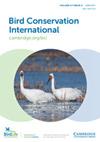Distribution and habitat assessment of an Endangered hummingbird: the Grey-bellied Comet Taphrolesbia griseiventris
IF 1.5
4区 环境科学与生态学
Q3 BIODIVERSITY CONSERVATION
引用次数: 0
Abstract
Summary The Grey-bellied Comet (Taphrolesbia griseiventris) is a hummingbird species endemic to northern Peru and listed as Endangered by IUCN due to its small and fragmented population. Despite this, little has been attempted to increase knowledge of its natural history and ecology to provide current information and better evaluate its conservation status. Here, we used known curated records of the species from the literature to generate a model of its potential distribution using MaxEnt, and we then validated the model in the field through direct observation in selected areas. Where the species was confirmed, we conducted a habitat characterisation with field data, and a threat assessment of the landscape using secondary data in ArcGIS. We found five new records of the species in the department of La Libertad at two different sites, confirming a new population. The habitat mostly comprised Andean scrub (17.6%) throughout its distribution, and the main threat in the habitat was human-induced fires for agricultural purposes and as a means of waste disposal. Our findings revealed new information on the distribution of the species with a potential habitat occupancy of 4–6% within its range. Furthermore, areas that were previously reported to harbour a population of the species no longer showed records despite intensive searches in the field. Finally, we discuss the implications for its conservation. Our results indicated that conservation measures to protect the Grey-bellied Comet are urgently needed, especially the declaration of a reserve in La Libertad, which might be the only area where the species is reliably present with good quality habitat.一种濒危蜂鸟:灰腹彗星的分布和栖息地评估
灰腹彗星(Taphrolesbia griseiventris)是秘鲁北部特有的一种蜂鸟,由于其种群数量少且分散,被世界自然保护联盟列为濒危物种。尽管如此,很少有人尝试增加对其自然历史和生态的了解,以提供当前的信息和更好地评估其保护状况。在这里,我们使用文献中已知的物种整理记录,使用MaxEnt生成其潜在分布模型,然后通过在选定区域的直接观察在现场验证该模型。在确认物种的地方,我们利用野外数据进行了栖息地特征描述,并利用ArcGIS中的二次数据对景观进行了威胁评估。我们在拉利伯塔德省的两个不同地点发现了该物种的五个新记录,确认了一个新的种群。该生境主要由安第斯灌木构成(17.6%),其主要威胁是人为引起的农业火灾和作为废物处理手段的火灾。研究结果为该物种的分布提供了新的信息,该物种在其分布范围内的潜在栖息地占有率为4-6%。此外,尽管在实地进行了密集的搜索,但以前报告有该物种种群的地区已不再显示记录。最后,我们讨论了对其保护的意义。我们的研究结果表明,迫切需要采取保护措施来保护灰腹彗星,特别是在La Libertad宣布保护区,这可能是该物种唯一可靠存在的优质栖息地。
本文章由计算机程序翻译,如有差异,请以英文原文为准。
求助全文
约1分钟内获得全文
求助全文
来源期刊
CiteScore
3.40
自引率
6.20%
发文量
50
审稿时长
>12 weeks
期刊介绍:
Bird Conservation International is a quarterly peer-reviewed journal that seeks to promote worldwide research and action for the conservation of birds and the habitats upon which they depend. The official journal of BirdLife International, it provides stimulating, international and up-to-date coverage of a broad range of conservation topics, using birds to illuminate wider issues of biodiversity, conservation and sustainable resource use. It publishes original papers and reviews, including targeted articles and recommendations by leading experts.

 求助内容:
求助内容: 应助结果提醒方式:
应助结果提醒方式:


